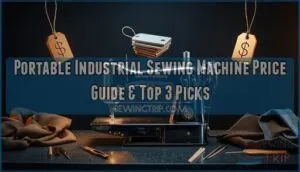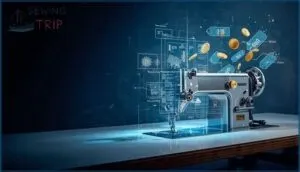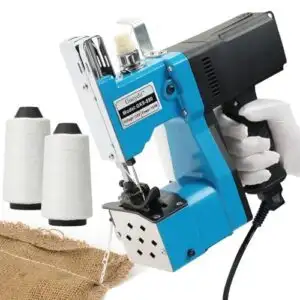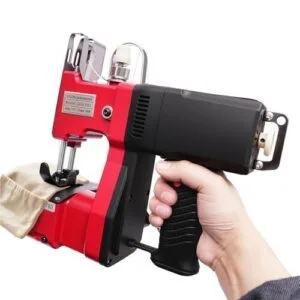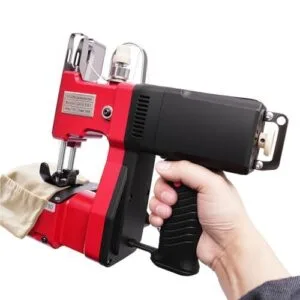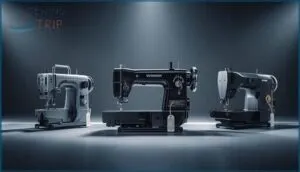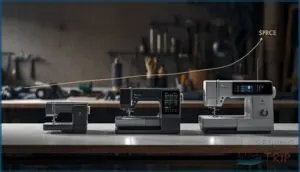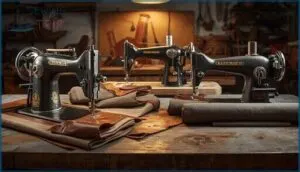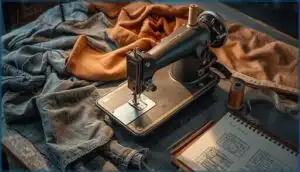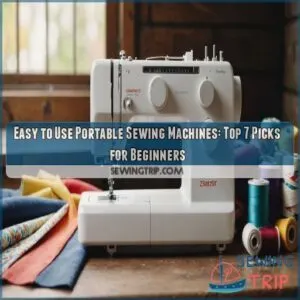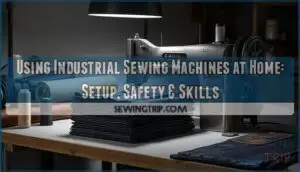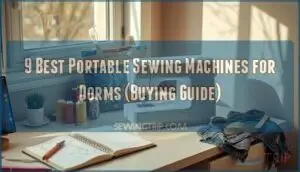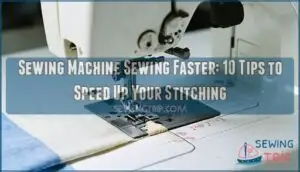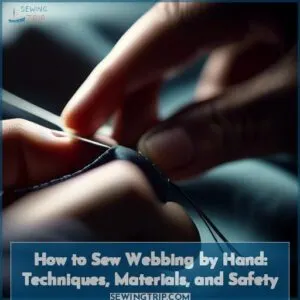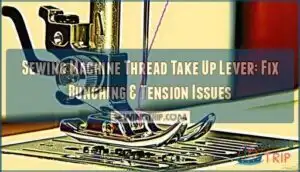This site is supported by our readers. We may earn a commission, at no cost to you, if you purchase through links.
A $400 entry-level portable industrial sewing machine breaks down within six months, costing your operation twice that amount in downtime and emergency replacements. Meanwhile, a $1,500 mid-range unit runs flawlessly for years, delivering consistent output that pays for itself in under half a year. The portable industrial sewing machine price you pay upfront matters far less than the total cost of ownership—yet most buyers focus exclusively on that initial number.
Understanding what drives pricing differences, from stitch speed capabilities to build materials, separates smart investments from costly mistakes.
The market spans from $230 refurbished units to $2,500+ premium models, each tier offering distinct performance benchmarks that align with specific operational demands.
Table Of Contents
Key Takeaways
- Total cost of ownership matters more than upfront price—a $400 entry-level machine that fails in six months costs twice as much as a $1,500 mid-range unit that runs reliably for years and pays for itself in under six months.
- Price differences across the $230-$2,500+ market spectrum correlate directly with technical specifications like stitch speed (1,500-5,500 SPM), build materials (cast iron frames vs. aluminum), power sources (battery vs. electric), and specialized functions (skip-stitch, differential feed).
- Real ROI comes from matching machine capabilities to your specific operation—assess volume requirements, material thickness compatibility, and duty cycles before purchase, since properly selected industrial machines deliver 38-54% output gains with payback periods of just 4-7 months.
- Feature prioritization beats price chasing—invest in metal housing over plastic, verify warranty coverage (1-5 years for motors), and prioritize stitch-per-minute ratings that align with production demands, because refurbished units may save 30-50% but risk hidden defects and warranty gaps.
Portable Industrial Sewing Machine Price Overview
When you’re shopping for a portable industrial sewing machine, price tags can range from around $230 for basic models all the way up to $2,000 or more for specialized equipment. Understanding what drives these cost differences helps you avoid overpaying while still getting the features you actually need.
Let’s break down the current market ranges, the factors that push prices up or down, and where the industry is headed in the coming years.
Current Market Price Ranges
You’ll find portable industrial sewing machine market prices spanning a broad spectrum. Entry-level pricing starts around $400 to $500 for lighter-duty models, while mid-range costs customarily fall between $1,000 and $2,000 for enhanced durability. High-end machines with sophisticated capabilities can exceed $2,500.
Don’t overlook the used market—refurbished options may start near $300, though condition varies greatly across portable sewing machine models available today.
The market is seeing growth due to online distribution channels.
Factors Influencing Price Variations
Several elements directly shape what you’ll pay for portable industrial sewing machines. Understanding these variables helps you control costs without sacrificing performance.
- Stitch speed – Models ranging from 1,500 to 5,500 stitches per minute command different market price points based on production capacity needs.
- Build quality – Reinforced frames and corrosion-resistant components increase durability, justifying higher portable sewing machine sales prices.
- Power source – Battery-operated models cost more than electric alternatives due to integrated power management technology.
- Brand influence – Established manufacturers leverage reputation and service networks, while emerging brands compete aggressively on portable sewing machine models pricing.
Market conditions and regional manufacturing location further affect industrial sewing machines costs across suppliers. The market is expected to reach USD 4785 million by 2032.
Pricing Trends in 2024 and Beyond
Market growth accelerates as digital sales channels undercut retail prices by roughly 10%, reshaping portable sewing machine sales dynamics. You’ll find portable equipment on sale more frequently as online platforms expand at 6.45% CAGR.
Technological adoption—Industry 4.0 integration and IoT features—pushes premium handheld sewing machine models higher, while regional trends show Asia-Pacific demand surging.
Future outlook points toward USD 20.53 billion by 2033, with market price stabilization despite competitive pressures.
Key Features Affecting Machine Pricing
Not all portable industrial sewing machines carry the same price tag, and understanding what drives those differences helps you make smarter purchasing decisions. The features you choose directly impact both upfront costs and long-term value, from basic stitch capabilities to sophisticated automation.
Let’s break down the key technical specifications that move the needle on pricing.
Stitch Types and Speed Capabilities
Different stitch types and their speed capabilities directly shape what you’ll pay for a portable industrial machine. Lockstitch durability and chainstitch flexibility meet different production demands, while overlock stitching prevents fraying at high speeds. Consider these performance factors:
- The 5200B two thread single needle handheld delivers reliable chainstitch for bag closing applications
- Speed optimization through AI integration adjusts tension and stitch length automatically based on fabric type
- Handheld sewing machine models like the 2200B portable bag closing sewing machine balance moderate RPM with portability for on-site weaving tasks
Higher speeds and adaptable stitch options command premium prices but deliver faster ROI.
Power Sources and Portability
When evaluating portable handheld sewing machines, power sources directly affect market price and operational flexibility. Battery-powered models enable cordless operation in remote bag closing tasks, with battery runtime spanning 2-6 hours per charge. USB charging adds convenience, while servo efficiency cuts energy consumption by up to 60%.
Weight impact matters too—expect lighter cordless units under 3.5 lbs to command higher prices than their AC-powered counterparts.
Build Quality and Durability
Sturdy Material Composition sets the pricing floor—portable handheld machines built with cast iron frames and hardened steel internals cost 30-50% more than aluminum-body units, yet deliver stability features that matter under Heavy-Duty Use.
You’ll find lifespan factors like chrome-plated hooks and tungsten carbide feed dogs extend service life to 10-25 years in industrial applications, directly justifying premium pricing despite limited customer reviews on newer models.
Specialized Functions (e.g., Skip-stitch, Differential Feed)
Skip-stitch impact on seam integrity pushes pricing 15-40% higher when paired with Differential Feed systems that adjust fabric tension ratios from 0.7 to 2.0—critical for preventing puckering on knits and leather.
Programmable Stitches expand portable handheld utility across applications, though Function Maintenance demands skilled technicians.
These Pricing Factors separate market price tiers, yet customer reviews on models currently on sale rarely detail long-term reliability.
Top 3 Portable Industrial Sewing Machines
You’ve seen the price ranges and features that matter—now let’s get specific.
The three machines below represent proven workhorses in the portable industrial space, each tackling bag stitching and closure applications with different strengths.
Here’s what you need to know about your top options.
1. Guoydir Heavy Duty Bag Stitching Machine
The Guoydir Heavy Duty Bag Stitching Machine stands out in the industrial sewing machines category with a market price between $850 and $1,200. Its 190W motor delivers 1800-2000 stitches per minute, making it a reliable bag closing machine for woven bags, sandbags, and non-woven fabrics.
Material compatibility extends to thicknesses up to 0.15″, though maintenance needs include periodic thread adjustments.
User experience reports emphasize its heavy-duty sewing capabilities in warehouses and logistics centers, where Guoydir stitch quality consistently meets industrial applications demands.
Best For: Industrial facilities, warehouses, and logistics centers that need to sew heavy-duty woven bags, sandbags, and thick non-woven materials at high speed.
- Fast sewing speed of 1800-2000 stitches per minute handles high-volume production efficiently
- Lightweight at 6.6 lbs with one-hand operation makes it portable for mobile or on-site work
- Powerful 190W motor tackles thick materials up to 0.15″ without losing performance
- Speed is too fast for precise control, making it difficult for beginners or detailed work
- Not suitable for household sewing, delicate fabrics, or materials like leather that need slow stitching
- May require additional fixtures or speed controls to use effectively in certain applications
2. Heavy Duty Portable Bag Stitching Closer
If you’re looking to improve throughput without breaking the bank, Heavy Duty Portable Bag Stitching Closers deliver market price points between $98.80 and $130.18—an attractive entry for budget-conscious operations.
These bag closing machines achieve 1,250 stitches per minute, translating to roughly 300 bags per hour in real-world conditions. Material compatibility spans woven PP, jute, paper, and laminated fabrics, while automatic lubrication systems minimize downtime.
Their operational efficiency shines in agricultural and fertilizer industrial applications, where stitching capacity meets demanding production schedules. You’ll find these industrial sewing machines offer solid ROI for mid-volume bag sealing tasks.
Best For: Mid-volume operations in agriculture, fertilizer, and food processing that need reliable bag sealing at 300+ bags per hour without a major capital investment.
- Fast stitching at 1,250 stitches per minute keeps production moving and handles diverse materials from woven PP to jute and paper bags.
- Automatic lubrication and low maintenance design cut downtime and reduce the need for constant operator intervention.
- Affordable price range of $98–$130 delivers solid ROI for businesses ramping up packaging capacity on a budget.
- Mid-tier stitch speed may bottleneck high-volume lines that need 3,000 stitches per minute from conveyor-fed systems.
- Handheld portability trades off the stability and consistency of stationary industrial models during extended shifts.
- Limited warranty and support information leaves some uncertainty around long-term service and replacement part availability.
3. Portable Electric Bag Stitching Sewing Machine
When weighing Bag Stitcher Pricing against output capacity, Portable Electric Bag Stitching Sewing Machines command $200–$600, depending on Performance Features. These Chainstitch Sewing Machines deliver 1,800–2,600 stitches per minute—much faster than conventional Bag Closing Machines.
Material Compatibility extends across kraft paper, jute, and woven polypropylene, addressing diverse industrial packaging needs. The Portability Design, usually under 5 kg with aluminum construction, allows deployment across multiple job sites.
Market Trends show a 7% CAGR through 2033, driven by e-commerce expansion and DIY culture growth.
Best For: Small to mid-size businesses in agriculture, food packaging, and industrial sectors that need to seal 300+ bags per hour across materials like jute, kraft paper, and woven polypropylene.
- High-speed operation at 1,800–2,600 stitches per minute cuts labor time and boosts throughput for high-volume packaging tasks.
- Lightweight portability under 5 kg with aluminum construction makes it easy to move between job sites without sacrificing durability.
- Wide material compatibility handles everything from kraft paper to synthetic fabrics, with adjustable thickness settings up to 6mm for different bag types.
- The 6mm maximum thickness won’t work for extra-heavy industrial materials or multi-layered specialty bags.
- 110V-only voltage limits use in regions with different electrical standards without a converter.
- At 2.9 kg, the weight may cause fatigue during extended handheld operation, and no warranty details raise concerns about long-term support.
Comparing Leading Brands and Models
When you’re ready to invest in a portable industrial sewing machine, the brand you choose can make or break your ROI. Consew, Yamata, and Union Special each bring different strengths to the table, from pricing structures to specialized features that matter in real-world production environments.
Let’s break down how these leading manufacturers stack up so you can match the right machine to your specific application needs.
Consew Vs. Yamata Vs. Union Special
When you’re comparing portable industrial sewing machines, Consew, Yamata, and Union Special each bring distinct strengths to the table. Consew machines excel in automotive upholstery and heavy-duty applications, operating at 2,500-3,000 SPM with solid metal builds.
Yamata offers competitive speed and durability factors between $800-$1,200.
Union Special specializes in geosynthetics and synthetic turf at 11 pounds, though their warranty coverage and portability metrics justify higher price points around $3,195.
Differences in Model Features and Pricing
Beyond brand reputation, you’ll find model feature comparison reveals clear price-performance patterns across handheld sewing units. Industrial sewing machines with programmable settings or digital displays add $200-$600 to base costs—value-added features that justify the premium.
GeoTextile sewing machines and bag closing machine models on sale commonly include skip-stitch and differential feed around $600+, demonstrating how brand pricing strategies align with feature price correlations.
Application-specific Recommendations
Match your machine choice to the work you’ll tackle. Upholstery applications and automotive interiors demand thick-needle compatibility and servo motors—these cost $1,500-$2,500 but handle leather effortlessly.
Marine canvas and home businesses benefit from walking-foot GeoTextile sewing machines around $800-$1,200.
For bag closing operations and custom manufacturing, handheld sewing units with automatic cutters deliver ROI through speed. GeoTextile and bag closing machines justify premium pricing when application-matched correctly.
Tips for Choosing The Right Portable Machine
You’ve seen the price ranges and compared the top models, but choosing the right portable industrial sewing machine isn’t just about finding the lowest price tag.
The machine that delivers real value matches your specific sewing tasks, accommodates your production volume, and works reliably with the materials you use most.
Here’s what you need to evaluate before making your purchase.
Assessing Industrial Application Needs
Your industrial sewing machine applications dictate everything. Assess volume requirements first—high-throughput commercial operations demand machines exceeding 5,000 stitches per minute.
Match material compatibility to your heavy-duty sewing needs, whether you’re working with leather or technical fabrics.
Consider on-site needs for field repairs, automation features for repetitive tasks, and lifecycle considerations including duty cycles.
Don’t let specs overwhelm you—focus on what your commercial operations actually require.
Evaluating Value Vs. Price
Smart buyers balance up-front price against genuine ROI calculation. You’ll see average payback in just 4–7 months when industrial sewing machines boost your output by 38–54%. Here’s your Feature Prioritization checklist:
Industrial sewing machines deliver 38–54% output gains with payback in just 4–7 months when you balance price against ROI
- Brand Reputation – Look for warranty spans of 1–5 years and resale values 24–32% higher
- Long-Term Costs – Industrial models cost 9–13% less annually in maintenance
- Automation advantages – Skip-stitch cuts labor by 19%, justifying premium pricing
- User Reviews – 20.4% highlight durability as the key value driver
Commercial sewing machines on sale still need proven ROI.
Important Accessories and Compatible Threads
You’ll realize full machine potential with the right add-ons. Presser foot types like Teflon variants handle 39% of garment applications, while zipper feet dominate 34% of accessory sales.
Bobbin management matters—83% of buyers grab extra sets immediately. Needle compatibility charts prevent breakdowns; polyester thread captures 54% of selections.
Don’t overlook extension tables (41% adoption) or essential accessories like 277 polyester bonded black thread for demanding textile projects.
Frequently Asked Questions (FAQs)
Can these machines handle thick materials like leather?
Like a blacksmith forging iron, your portable industrial sewing machines can handle heavy-duty materials.
Leather sewing machines with proper motor power features and feeding presser design tackle up to 1/4-inch leather thickness effectively.
What warranty coverage do most manufacturers typically offer?
Most industrial sewing machines include 1-year warranties covering defects in materials and workmanship. Motors generally receive 1-to-5-year coverage, while consumable parts like needles and belts aren’t covered.
Brand variations exist—Singer offers 25-year warranties on machine heads.
Are refurbished models worth considering for budget buyers?
Refurbished industrial sewing machines deliver 30-50% savings with certified quality standards, though you’ll face warranty gaps and potential hidden defects.
Budget buyers gain sustainable purchasing advantages if they verify documentation and accept possible long-term costs.
How long do portable industrial machines typically last?
Industrial sewing machines commonly run 10 to 20 years with proper care.
Your portable unit’s lifespan hinges on maintenance impact, usage intensity, build quality, and storage conditions—factors that separate decades of reliable heavy-duty sewing from premature equipment failure.
Conclusion
Think of your purchasing decision as a foundation: if the portable industrial sewing machine price reflects shortcuts in motor quality or frame construction, you’ll rebuild that foundation repeatedly.
Your operation demands equipment that matches workload intensity, material thickness, and production volume. Prioritize stitch-per-minute ratings, metal housing over plastic components, and warranty terms that protect multi-year investments.
The right machine doesn’t just fit your budget—it eliminates the hidden costs that drain profitability long after purchase.
- https://sewingmachineshop.com/sewing-machine-reviews/
- https://www.linkedin.com/pulse/north-america-portable-sewing-machine-market-size-2026-highlights-x5quf
- https://www.almachinings.com/7-key-factors-influencing-sewing-machine-and-belt-conveyor-prices.html
- https://dataintelo.com/report/portable-sewing-machine-market
- https://www.globenewswire.com/news-release/2025/01/07/3005608/28124/en/Industrial-Sewing-Machines-Market-Report-2024-2028-and-2033-Mobile-Tech-Textiles-Spark-New-Opportunities-Automotive-Industry-Expansion-Drives-Demand-for-Specialized-Sewing-Machines.html

